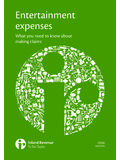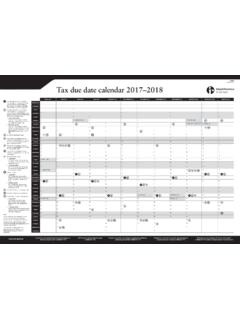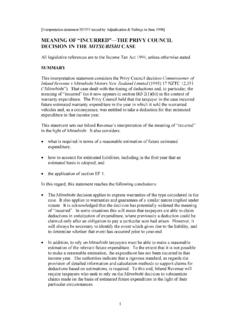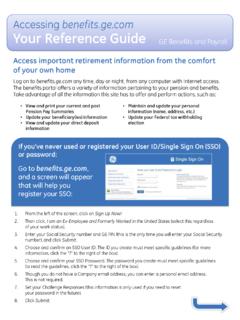Transcription of Trusts' and estates' income tax rules - Inland Revenue
1 Trusts and estates income tax rulesIR288 November 2018 TRUSTS AND ESTATES2 The information in this guide is based on current tax laws at the time of to our website for information and to use our services and tools. Log in or register for myIR to manage your tax and entitlements online. Demonstrations - learn about our services by watching short videos. Get it done online - complete forms and returns, make payments, give us feedback. Work it out - use our calculators, worksheets and tools, for example, to check your tax code, find filing and payment dates, calculate your student loan repayment. Forms and guides - download our guides and your myIR user ID or password?Request a reminder of your user ID or reset your password online. You'll need to know your IRD number and have access to the email address we hold for 5 trust returns 5 Glossary 6 Part 1 - Explaining the important concepts 8 How a trust starts 8 Information a settlor must give us 9 How the trust earns income 9 Estates 10 The trust 's income 10 Foreign trusts disclosure and record keeping rules 11 Part 2 - Different types of trusts 12 Complying trusts 12 Foreign trusts 13 Non-complying trusts 13 New arrivals in New Zealand 13 Part 3 - How the trust 's income is taxed 15 Tax on trustee income 15 Tax on beneficiary income 17 Part 4 - Other distributions to beneficiaries 21 Distributions from complying trusts 21 Distributions from foreign trusts 22 Distributions from non-complying trusts 23 Foreign tax credits 24 Electing to
2 Become a complying trust 24 Part 5 - Tax returns for trusts and beneficiaries 26 The trust 's tax return 26 The beneficiaries' tax returns 28 Tax returns for a deceased person's estate 29 Charitable trusts or estates 30 Final trust or estate return 30 TRUSTS AND ESTATES4 Part 6 - Provisional tax 31 The principle of provisional tax 31 Circumstances when a trust must pay provisional tax 31 Provisional tax calculation methods 32 Use-of-money interest (UOMI) 33 Late payment penalties 35 Summary - tax rates and time limits 36 For more help 370800 self-service numbers 37 Need to talk to us? 37 Privacy 38If you have a complaint about our service 38 Publications 39 How to get our forms and guides guide explains: the basic concepts of a trust or estate how a trust 's income is divided up for tax purposes how each part is this guide, the term " trust " also applies to estates unless specifically stated otherwise.
3 This information doesn't apply to unit trusts (as these are treated as companies for income tax purposes) or trusts that are superannuation funds (as different rules apply).A glossary of terms is on page returnsIf your trust won't have any taxable income in any tax year, please call us on 0800 377 774 with the name and IRD number of the trust so we can record that a return isn't required for that , if the trust receives any assessable income , eg, interest, the trustee must file a return, regardless of the amount the trust subsequently derives assessable income in a future year, the trust must send in a only applies to trust returns. Estates are still required to file a return of income , regardless of whether or not they have derived assessable AND ESTATES6 GlossaryAssociated personsAssociated persons are defined as: two companies a company and a person other than a company two relatives a person and a trustee for a relative a trustee and a beneficiary trustees with a common settlor a trustee and a settlor a settlor and a beneficiary a trustee and a person with the power of appointment or removal of the trustee a partnership and a partner two persons who are each associated with the same third person (tripartite test).
4 For full details on associated persons read A guide to associated persons definitions for income tax purposes (IR620). You can download this from "Forms and guides".Charitable trustA charitable trust is one in which the income can be used only for charitable purposes. For more information on charitable trusts, read our guide Charitable organisations (IR255).CorpusThis is the market value of any property settled on a trust , at the date of of propertyAny form of transfer, conveyance, assignment, settlement, delivery, payment or other allocation of property to a trust (or for its benefit) is a disposition of property. This includes dispositions made under a person's will and through intestacy (dying without a will).Inter vivos trustThis is a trust settled during the lifetime of the settlor. This term is used when working out whether trustee income from overseas is subject to New Zealand income are a New Zealand tax resident in any of these situations: you're in New Zealand for more than 183 days in any twelve-month period, or you have an enduring relationship with New Zealand, or you have a permanent place of abode in New Zealand, or you're away from New Zealand in the service of the New Zealand trustA trust created by a person's will, codicil or intestacy (dying without a will), or by a court order at the time of the person's residentA transitional resident is an individual who has arrived in New Zealand after 1 April 2006 and qualifies for a temporary tax exemption on their foreign qualify as a transitional resident, the individual must not have been resident in New Zealand for the last 10 years, or have been a transitional resident more information see, "Temporary tax exemption on foreign income for new migrants and returning New Zealanders" at AND ESTATES8 Part 1 - Explaining the important conceptsHow a trust startsTo create a trust , a person (the settlor)
5 Gives money or property to another person (the trustee), to be held in trust for the benefit of either the trust 's beneficiaries, or a purpose recognised by law. There should be a signed trust deed (agreement) that acknowledges the settlement, but it's possible to establish a trust trustee holds the trust 's property in trust for the beneficiary, and administers or manages the trust . A trustee includes an executor or administrator of an estate , which may be the Public Trustee or the M ori Trustee. Companies may also act as settlor of the trust can include any person who at any time: transfers value to a trust , or for the benefit of the trust , or on terms of the trust provides financial assistance to the trust for its are called may also be settled by who is a settlor of a trust and whether they're a resident is important for establishing whether the trust 's overseas income is taxable in New Zealand. These factors also affect the category of a trust (complying, foreign, or non-complying - explained in Part 2 of this guide) and which distributions to beneficiaries are settlement is any action that makes a person a settlor of a trust and includes any of the following.
6 Disposal of any property to the trust for less than market value property or funds made available to the trust for less than market value services provided to the trust for less than market value any property acquired from the trust or any service from the trustee for greater than market also includes any failure to act or enter into any or part of any of the above courts will only recognise that a valid trust has been created if it's covered in a trust should seek professional advice about drawing up a trust a settlor must give usA New Zealand resident settlor must tell us the details within three months of making a settlement on a trust that doesn't have New Zealand resident trustees. The settlor must also give us the names and addresses of the trust 's trustees and beneficiaries. For disclosure purposes, a settlement also includes a settlement made as a nominee of another person, or of a nominal amount made at the request of another settlor of a trust who is resident in New Zealand for any part of the income year, may be taxed as an agent of the trustee on trustee income which is derived in that income year, if the trust ceases to have a New Zealand all the trustees of the trust cease to be New Zealand residents, the settlor must tell us within three months of the date on which the trust ceased to have a resident each of these situations, the settlor must complete a Settlors of trusts disclosure (IR462) form within three months and send it to AND ESTATES10 How the trust earns incomeUsually, the money or property settled on the trust is used as an investment to earn further Revenue , or as capital to fund a trading operation.
7 This Revenue becomes the trust 's income as it's earned. The initial settlement on the trust isn't income for tax purposes, but the settlor may have to pay gift duty on it if it's received before 1 October 2011, depending on the value of the trust tax rules also apply to estates of people who have died, if such an estate continues to earn income after the person's death. When we refer to "trusts" in this guide we also include estates, unless specifically excluded by the trust 's incomeThe trust 's income is deemed to include certain settlements of property on a trust . Property settled by a trustee of another trust so long as it would have counted as income if that trust had distributed the property to one of its beneficiaries instead (see page 21). A settlement of property on a trust , which would, if not for the settlement, have constituted: gross income of the settlor, or a dividend for which the settlor would have, if not for settlement, been liable to deduct FDP (foreign dividend payment) if the settlor is a resident or if the settlor had been a resident in New Zealand and subject to our income tax laws at that time.
8 A settlement of property on a trust for which the settlor claims a deduction from gross income for New Zealand tax property settlements are excluded from the definition of trust 's income is separated into two parts for tax purposes: beneficiary income and trustee income . The tax on these two parts is then calculated separately, to arrive at the total tax payable on the trust 's income . Here's how the income is allocated: Beneficiary income is an amount of income derived by a trustee of the trust and allocated to a beneficiary during any income year that either: vests absolutely in the beneficiary during that income year, or is paid or applied for the benefit of the beneficiary within six months after the end of that income Trustee income is all income the trust earns in its income year that: does not vest absolutely in the beneficiary during that income year, or is not paid or applied for the benefit of the beneficiary within six months after the end of that income can make other types of distributions, some of which will also be taxable.
9 These other distributions are explained in Part 4 of this the trust 's tax is calculated depends on the type of trust , and whether the settlor and/or trustees are New Zealand residents. The different types of trust are explained in Part 2 of this trusts disclosure and record keeping rulesResident foreign trustees (including complying resident foreign trustees) are required, for each foreign trust they administer, to: complete and submit to us a Foreign trust disclosure (IR607) form, and keep financial and other records for New Zealand tax can get the IR607 from our website "Forms and guides", or by emailing must be completed by resident foreign trustees appointed: if on or after 1 October 2006, within 30 days after the later of the date of appointment as a trustee, or the date of the trustee's arrival in New Zealand if before 1 October 2006, within 60 days after the later of 1 October 2006, or the date of the trustee's arrival in New informationFull details of the rules are in the Tax Information Bulletin Vol 18, No 5 (June 2006).
10 TRUSTS AND ESTATES12 Part 2 - Different types of trustsFor income tax purposes, there are three types of trust : complying trusts foreign trusts non-complying type of trust is important, because it determines whether some distributions from a trust are trustsA complying trust is one that has been taxed in New Zealand on all its trustee income since the date it trusts include: trusts settled by New Zealand residents with New Zealand trustees estates of people who were New Zealand residents when they died other trusts which have elected to become a complying trust remains a complying trust if, since settlement of the trust , the trustees have satisfied all their obligations for its income tax trust isn't a complying trust if: the only trustee income is non-resident passive income , or the trustees earn foreign-sourced income excluded from the meaning of gross a trust ceases to meet the conditions for a complying trust in an income year, it will no longer be a complying trust - it will generally become a non-complying trust (see definition on page 13).















